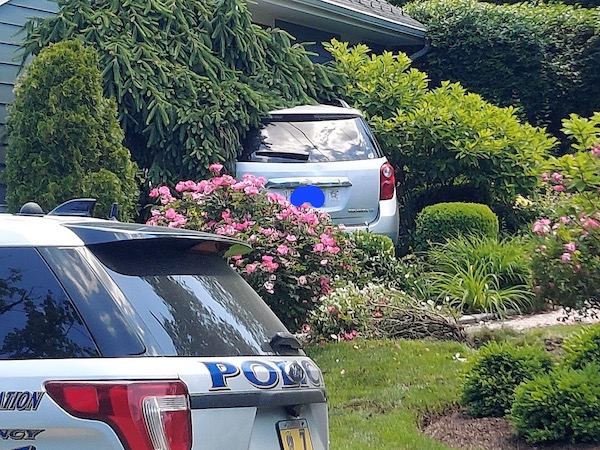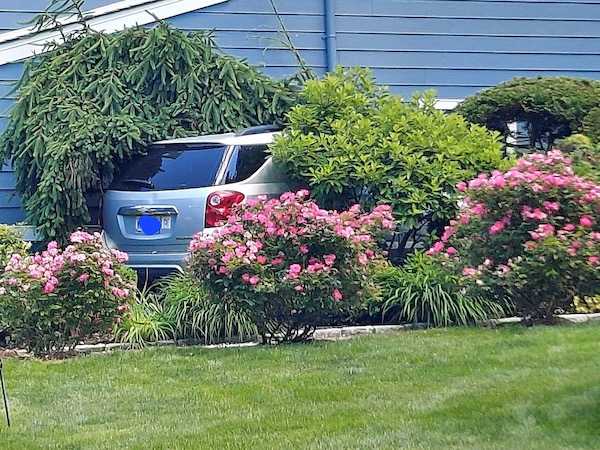Voter Information for August 23 Primary
- Details
- Written by: Joanne Wallenstein
- Hits: 2002
 In Scarsdale, there is an upcoming Democratic Primary Election for the U.S. Congress, District 16. (Please note, there is no Republican primary).
In Scarsdale, there is an upcoming Democratic Primary Election for the U.S. Congress, District 16. (Please note, there is no Republican primary).
• Now: Residents should check their voter registration status at: https://voterlookup.elections.ny.gov/
• July 29: Last day for your voter registration form to be postmarked. Last day to register to vote in person at the Westchester County Board of Elections’ Office (25 Quarropas Street, White Plains, NY 10601).
Please note the following deadlines regarding ABSENTEE BALLOTS:
• August 8: Last day for the Westchester County Board of Elections to RECEIVE an application for an absentee ballot by mail, email, fax letter, or web portal. The Board of Elections website details the variety of ways to apply for an absentee ballot. Note: Voters may still apply to vote by absentee ballot using the temporary illness clause, which includes being unable to appear due to risk of contracting or spreading a communicable disease like COVID-19.
• August 22: Last day to apply in person for an absentee ballot.
• August 23: Election Day. Last day to postmark a completed absentee ballot (must be received by August 30) or submit a completed absentee ballot in person.
The County Board of Elections website provides instructions for completing an absentee ballot.
EARLY VOTING for the August Democratic Primary Election is AUGUST 13-21, 2022:
• You may vote early at any of the designated Early Voting polling locations throughout the County. The Board of Elections website lists all polling locations and hours.
PRIMARY ELECTION DAY is TUESDAY, AUGUST 23, 2022:
You may vote only at your assigned polling location which you can look up here:
For information about the candidates, see Vote411.org, the website the U.S. League maintains with comprehensive information on elections nationwide.
On Monday, July 25, the League of Women Voters of Westchester is holding a Virtual Democratic Candidate Forum for U.S. Congressional District 16. Please register at this link:
Questions regarding voting in the Primary Election should be directed to our LWVS Voter Service Chairs at lwvsvoterservice@gmail.com.
Register Now for the Scarsdale Summer Youth Tennis League
- Details
- Written by: Joanne Wallenstein
- Hits: 2287
 (The following was submitted by Bob Harrison)
(The following was submitted by Bob Harrison)
The 38th season of the Scarsdale Summer Youth Tennis League continues on Monday July 18th for boys and girls ages 6 to 18 through early August on weekday evenings from 6 to 8 PM at the Middle School Tennis Courts .
The program is the best buy in Scarsdale youth sports with more than 28 hours of tennis play for $60 per player.
All players will play round robin matches with players of similar tennis ability and the program concludes with tournaments in each skill level with champion and runner-up trophies and a pizza and ice cream party. All players receive participation trophies.
Players can register by getting an application at the Recreation Department, 244 Heathcote Road or by calling 914 722-1160 and getting an application by e-mail.
For more information, call Bob Harrison, 38 year volunteer , founder and director of the program , at 914 646-4054 or by email at proscars@aol.com . Applications and checks can be made out to the Scarsdale Summer Youth Tennis League and delivered or mailed to Harrison at 65 Fox Meadow Road, Scarsdale , NY 10583.
Letter to the Editor: Building Trust and Moving Forward
- Details
- Written by: Diane Greenwald
- Hits: 1768
 This letter was written by Diane Greenwald.
This letter was written by Diane Greenwald.
It is unfortunate that the slim report released yesterday about the District payroll tax issues did not come with greater analysis by the board. I hope they will share more in the near future about what this means for the District going forward. Did this report meet their expectations? What did they learn and what questions remain? I want to acknowledge their efforts as intentional and responsible, if not perfect. They are committed to transparency, but they can do more, and I encourage them to consider how. Transparency does not mean all actions are public, but that all actions are contextualized and explained. I hope they will return to the public with greater insights and explain how they will take their learning and concerns forward.
What I think I get from the report and the sanction letters for senior staff, is that this chapter was a mistake, apparently human error without a crime, and hopefully it will be fixed, Scarsdale will eventually get the money back from an understaffed IRS, and new procedures will ensure this error doesn’t happen again. The good news is this mistake did not directly harm children. The bad news is we now know that the former superintendent lied and withheld information, seemingly out of self-serving arrogance, and his senior staff was too disenfranchised or too scared to connect directly with the board on this matter. Many parents in the community, and apparently faculty, have felt the unwelcoming culture that will sadly be Hagerman’s legacy.
Going forward, I will not focus on placing blame or looking for heads to roll. Frankly, even if its warranted, its likely a waste of resources in the highly regulated civil service world. And Hagerman is someone else’s problem now. I personally will be looking for bigger questions to be asked about our district culture, one that has been seemingly dysfunctional. In a school system that is meant to be a model of good will, non sibi, what will the board do now with this information? How can the board help heal divides and address issues that do impact kids, like faculty morale, student wellness, and developing a strategic plan with an actual strategy for investment into innovation and capital projects? Our resources may be ample, but they are finite, and we need tools for decision-making about looming needs. We can improve a budget process so that it better links to student priorities, parent values and faculty expertise in exciting ways! We need welcome.
There is reason for hope. The board has the opportunity now to hire a visionary, compassionate and innovative leader for our wonderful children, faculty and community. The board is on their way. They wrote an excellent RFP for the superintendent search firm, and will hopefully be explaining a vibrant search process, one that is accountable to a public plan on a timeline with ample opportunities for input and understanding. They have not gotten this right in the past, but I hope they will learn going forward. I look forward to learning the ways the community can engage and how the board will reflect their understanding of our collective values.
We, the supportive community, desperately want to trust the board’s leadership. The board can start that positive spiral by trusting us and respecting our capacity for reason and knowledge. I am tired of the mantra that allows parents to be considered toxic. I don’t deny there are entitled (difficult) folks here, but overwhelmingly, parents are the hardworking, supportive backbone of this district. Our children are filled with promise and we value and respect our talented faculty, who help our children grow into contributing global citizens. We need the board to help us come together around these wonderful shared assets.
In the communications that did accompany the report, I applaud the board for expressing commitment to collaboration with the administration, because that is absolutely the goal, to forge successful partnerships. I hope the board will expand focus on many partnerships across all stakeholders, like between board and the community, between faculty and administration, between parents and teachers, and teachers and students! I fear that board language about collaboration with the administration will ring hollow until parents and community can understand and feel changes in approach, attitude and actions. And then the trust will come back.
Thank you to the Board of Education for your fortitude in face of this difficult year. Please redouble your commitment to sharing your critical thinking with us, so we know you hear us and see what we see. Excellence is not perfection but the willingness to reflect and improve. Good luck going forward with your critical task. I am cautiously optimistic so please, prove my hope justified.
Stephanie Peltz and Daniel Faierman Married in Bridgehampton
- Details
- Written by: Joanne Wallenstein
- Hits: 5044
 It is with great pride that Brynn and Jay Peltz of Scarsdale, NY announce the wedding of their daughter, Stephanie Rachel Peltz to Daniel Phillip Faierman, son of Lori and Alvin Faierman.
It is with great pride that Brynn and Jay Peltz of Scarsdale, NY announce the wedding of their daughter, Stephanie Rachel Peltz to Daniel Phillip Faierman, son of Lori and Alvin Faierman.
Stephanie was born and raised in Scarsdale, NY. She attended Cornell University, earning a BS in Hospitality Administration with a minor in Real Estate. Stephanie currently works as a Senior Associate on the LP Originations team at RealtyMogul.
Daniel was born and raised in San Diego, CA. He attended Yale University, earning a BA in Psychology. Daniel is currently an MBA candidate at the Stanford Graduate School of Business.
Stephanie and Daniel were married on June 11, 2022 before friends and family at Bridgehampton Tennis and Surf Club in Bridgehampton, NY.
Teen Drives Car into Fox Meadow Home and More from the Scarsdale Police
- Details
- Written by: Joanne Wallenstein
- Hits: 6727

According to the police report, a senior at Scarsdale High School was driving north on Fox Meadow Road. As he approached the intersection of Wayside Lane he attempted to make a right turn, but lost control of the 2015 Chevy Equinox, drove over the curb, onto the property and ran into the house at 1 Wayside Lane.
Fortunately no injuries were reported.
Bicycle Hit
On Friday afternoon May 27 at 4:40 pm, the 67 year-old driver of a 2021 Mercedes SUV hit the front tire of a bike belonging to an 11 year old boy who was crossing the Post Road at Edgewood Road in the crosswalk.
Car Hits Home
An 82 year-old driver attempted to back out of a driveway on Rectory Lane and struck a retaining wall and a house, also on Rectory Lane at 6:30 pm on Friday June 3, 2022.
Stolen Jeep
A 2019 gray Jeep Cherokee, valued at $36,000 was reported stolen from the street in front of an Axtell Drive home on June 3, 2022. The owner thought the keys had been left in the Jeep which had been left unlocked.
Burglary
Police received a report of a broken window and possible burglary of a home on Griffen Avenue on June 4, 2022. The property manager who lives in a separate house on the property noticed a closet light on and called the police who went inside and found a broken window on the second floor.
Trespass
On June 1, Mamaroneck Road residents reported an attempted trespass at their home. The residents gave police security footage recording the attempt in the past. No entry was made into the building.
Pool Problems
On June 1, police were called about a pool that was being drained at a home on Murray Hill Road into a storm drain on the street without a permit. Police were unable to contact the homeowners but issued a violation for “drainage onto streets and sidewalk, with a court date of June 22, 2022.
Death
At 1:30 pm on June 1, police were called about the death of a 90 year-old woman on Old Lyme Road. She was pronounced dead by a paramedic from SVAC and her primary care physician agreed to sign the death certificate. Her remains were turned over to Edwin L. Bennett Funeral Home.
Found
-A Honda car key and fob found in front of Chat Restaurant were turned over to Scarsdale Police on June 1, 2022.
-A wallet containing $16, and two debit cards was found at Quaker Ridge School on June 4, 2022 and turned over to police.
Road Rage
On May 30, a female motorist claimed she was followed from Bronxville by a red colored vehicle that stopped following her close to her home on Brown Road. As she neared her home, the disgruntled driver behind her eventually stopped following her, and further conflict was avoided.
Fox Chases Resident
A Birchall Drive resident called police, claiming a fox chased her and her dog. The startled resident was safe by the time support arrived, and the fox slipped away without causing any further difficulties on May 30.
Fireworks in Eastchester
A resident on Boulevard heard fireworks being set off from an Eastchester Park. Upon arriving at the scene on May 30, nobody was at the scene, though the claims of the fireworks were corroborated. There was nothing else the Scarsdale Police could do about the issue at the time.
Milk Man Mix-up
On June 2, a Richbell Road resident contacted police when a white van backed into their driveway and two people walked out, claiming they were making milk deliveries. After clarifying that milk had indeed been ordered, the confusion was centered around the timing of the delivery.
Gas Leaf Blowers Complaints
There were many cases of neighbors calling about the use of gas leaf blowers despite their ban. Police distributed flyers to warn against potential future use.
Turtles Stop Traffic
On May 30, a Norma Place resident found a turtle stopped in the roadway. Responders moved the turtle to a pond area behind the residences nearby.
A Seneca Road resident called when they spotted a snapping turtle on their property on June 2. It was subsequently moved off the property and to safety.
Also on June 2, a Tisdale Road resident called police about a giant snapping turtle parked in the middle of their driveway with no way of moving it. The police found it was protecting an egg and advised the homeowner to contact animal services for its safe removal.
Fencing Fight
On June 3 a Hampton Road resident claimed her neighbor was removing a fence which belonged to her. Before the fence could be removed, police said the residents should contact Village Hall to discuss the location of the property line.
Bike Theft on June 4th
A Post Road resident called the police about someone stealing their bike overnight. The robbery was caught on film. The residents requested no further action to be made with the exception of raising awareness about the presence of certain thieves.
 This police report is sponsored by Scarsdale Security who does more than just security. Contact them about remote video for your home or business. Call 914-722-2200 or visit their website.
This police report is sponsored by Scarsdale Security who does more than just security. Contact them about remote video for your home or business. Call 914-722-2200 or visit their website.
- Director of Counseling Says Pandemic Has Had a Major Impact on the College Admissions Process
- Brown, Pascutti and Schulhof Elected, Budget Passes with 77% Approval Rate
- Hagerman Resigns Again Under the Cloud of an Investigation
- Proposal to Light Crossway Field to be Considered at Planning Board Meeting on May 4








